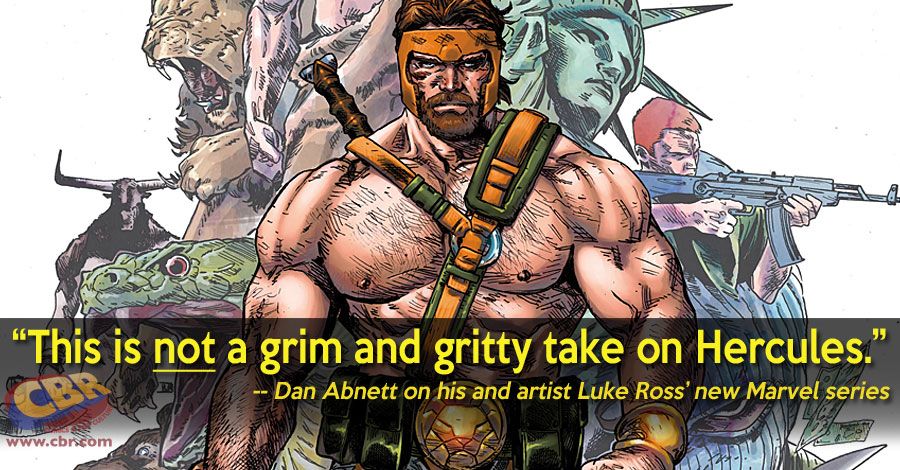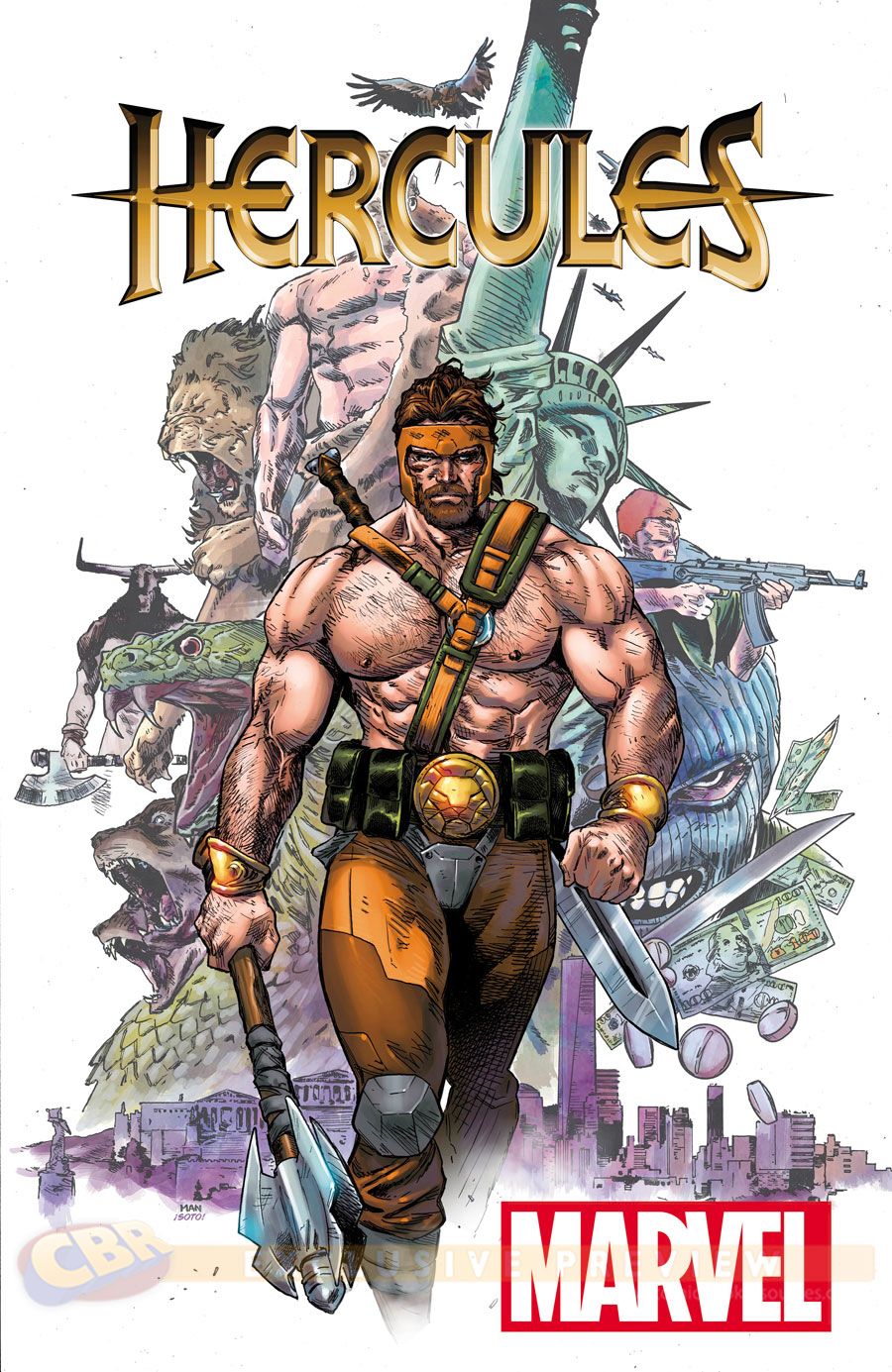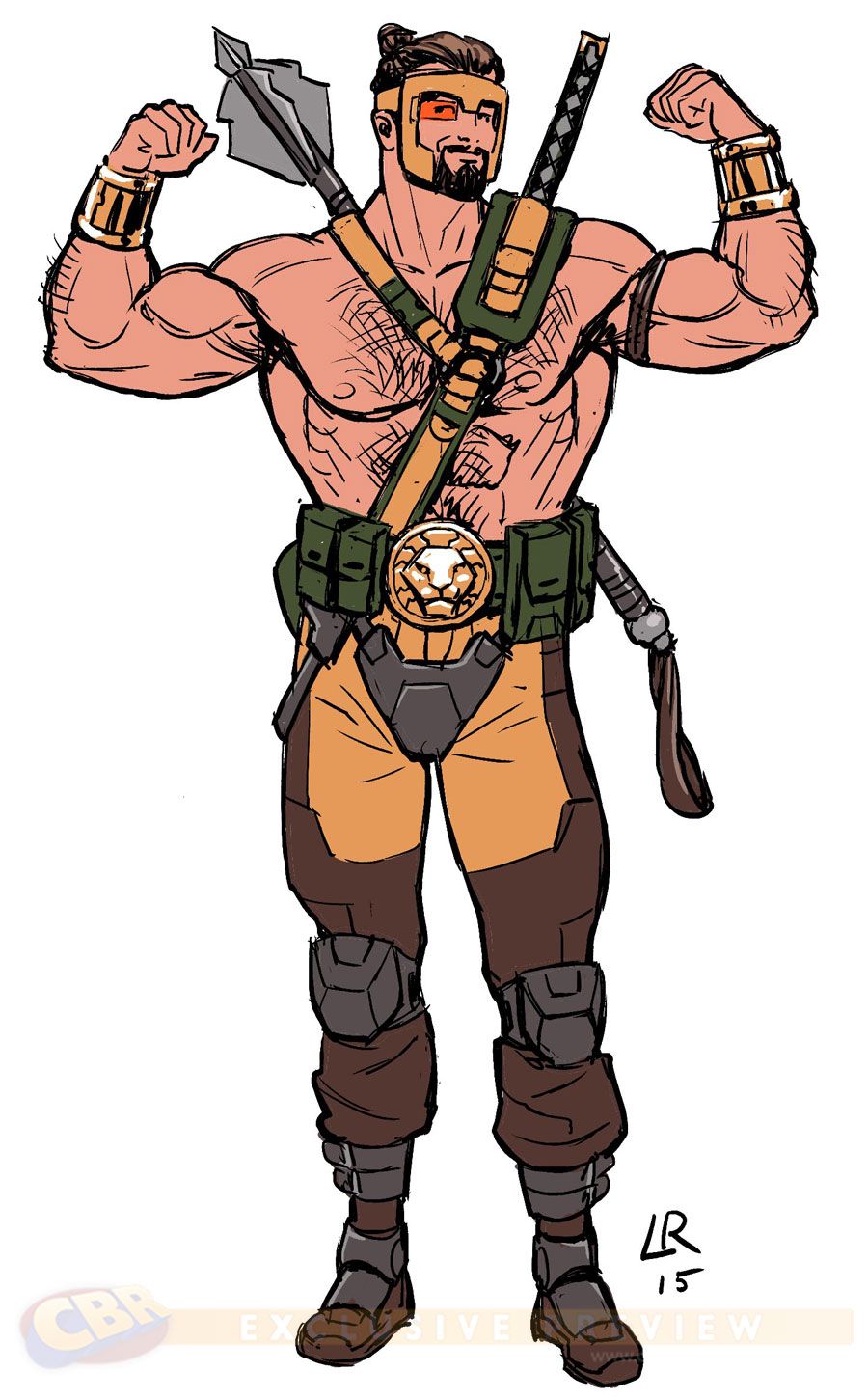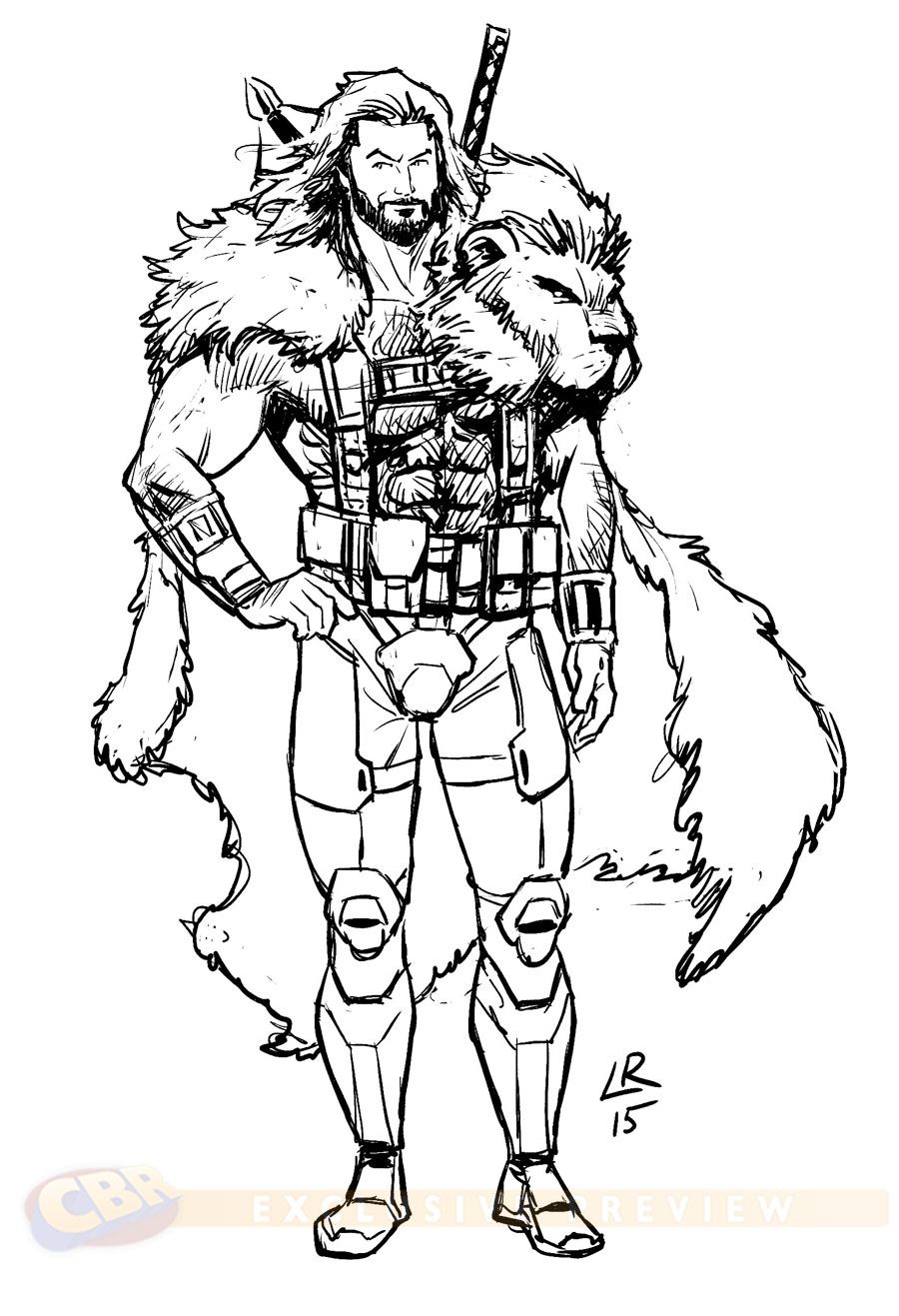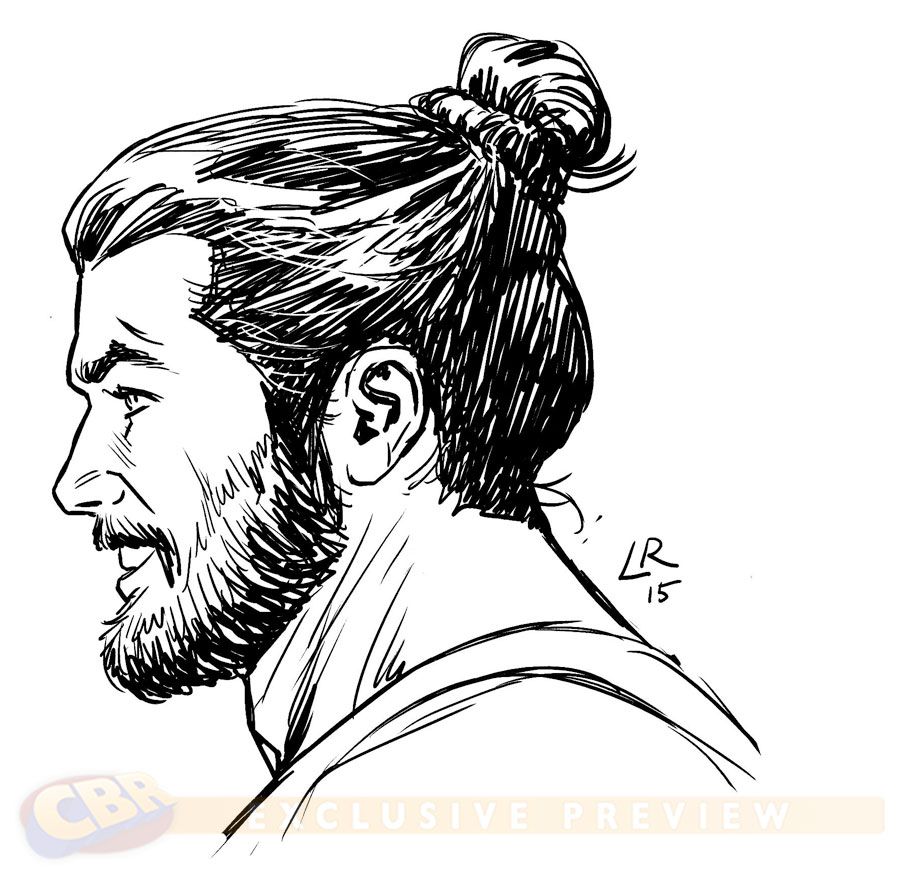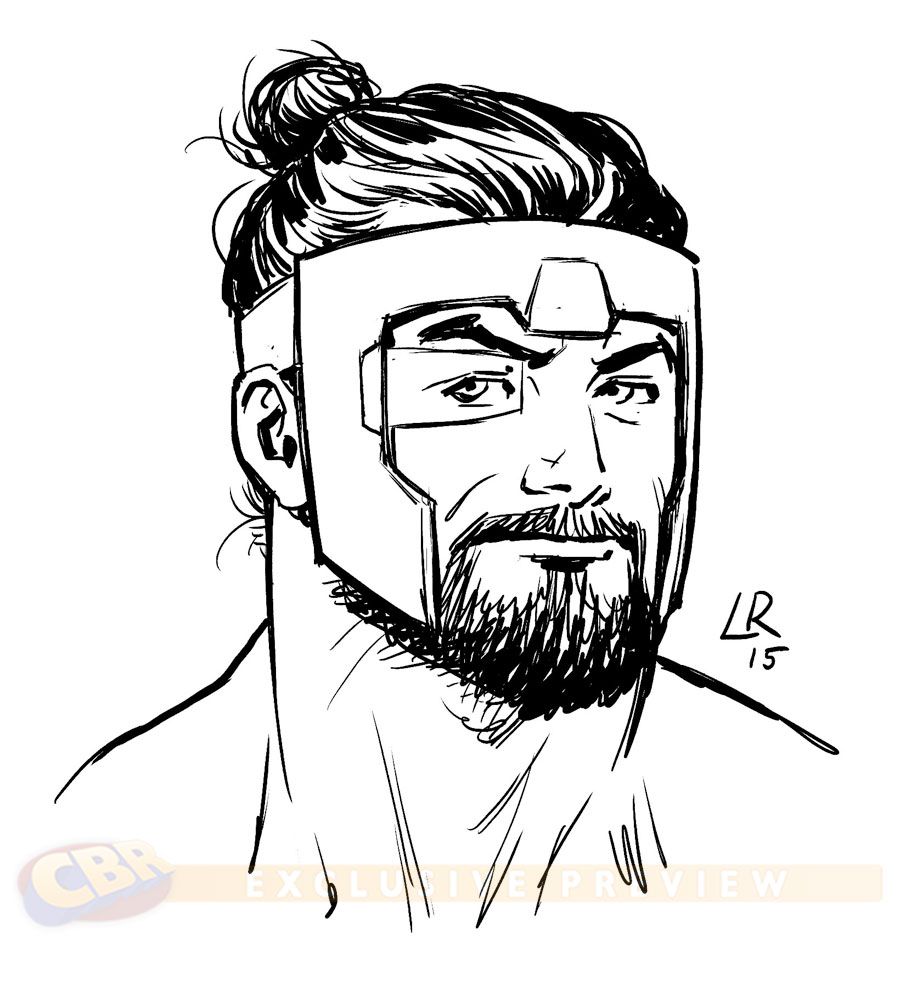Being one of the Marvel Universe's ageless beings often means confronting several lifetimes' worth of regret, but it also means it's never too late to atone and turn your life around, a lesson the Olympian demigod Hercules knows all too well. Over his centuries of life, he's done some good, but he's also misbehaved quite often.
In November, writer Dan Abnett and artist Luke Ross launch a new ongoing "Hercules" series. In it, Herc attempts to turn over a new leaf and become the hero he once was and knows he can be again. It's a quest that will have the Avenger confronting the challenges that arise when modern day Manhattan and the myths of various ancient cultures collide.
In an exclusive first interview, Abnett spoke with CBR News about his plans for the Olympian demigod, the way in which he and Ross will examine the character's past while honoring previous continuity, and the mythical and Marvel characters Herc will encounter on his quest to be a better hero and god.
CBR News: What made you want to tackle the adventures of Hercules, Dan? Are you a long time fan of the character?
Dan Abnett: The idea came to me because I was aware that I hadn't ever given Marvel's Hercules the sort of the consideration it deserved. I love the Marvel Universe and all the characters in it. I think Hercules is a fabulous addition to that and, as you said, there have been some great comics handling him over the years, Bob Layton's in particular. All of them tend to play up the combination of his immense god like power with a sort of fallibility and buffoonery, which I think works really well.
Because of the nature of "Secret Wars," I was restricted from using Thor. So I made damn sure that Hercules was part of [Korvac Saga"]. I wanted a big powerhouse demigod character. He wasn't in the original "Korvac Saga," but it made great sense to make him one of the key figures here. When I was writing the series I wasn't underwriting Hercules, but I was thinking of him as the classic Hercules; the slightly outrageous sandal costume, the beard, the hearty embracing of life and the slightly buffoonish quality. I then thought, "Gosh! I've sort of got a blind spot about Hercules!" He's an accepted and essential part of the Marvel Universe, but always has sort of slightly qualified adventures.
Quite often I'll be writing a character and I'll wonder if they've got potential to lead a book on their own and with Hercules I thought he really has. Bob Layton, Fred Van Lente and Greg Pak have proved that he can, and I thought that might be an interesting line to pursue. I had this unexpected vision of how "Hercules" might work and informally pitched it to Katie Kubert, my editor on "Korvac." I asked her, "Is this interesting? Or am I being strange?" She said, "I really like that! Can you write it up in more detail?" From that we've got to a point where "Hercules" is a thing. It came out of a tangential interest in something that made me look at a very familiar character in a way that I hadn't before.
I want to keep the book very accessible and I want to make it very immediate. So the first few issues are going to appear to be done in one stories. He'll deal with one or multiple problems in an issue and there's a sense of closure, but there is the inevitable meta story. So his supporting cast's story rolls through those and we gradually get the impression that these apparently disconnected elements are going to be more connected. They are not necessarily all part of the same thing, but they are symptoms of the same problem. And yes, at least some of his major opponents are going to be new characters that are almost filling the vacuum left by the diminishing mythological presence of the world. That's going to be a fun thing to do.
I understand you're doing something a little different in "Hercules" that allows for all of the title's character's past established Marvel continuity, but also adds to his history.
Absolutely. I immediately went away and thought about Hercules the mythological character and immediately realized that his legend goes back to a time before he was even called Hercules. It's an incredibly ancient myth that probably even predates written language that's appeared in many cultures. Heracles is his most famous incarnation, but he's kind of this archetype and I was suddenly struck with this idea that it's almost like he's the first super hero. He's an extraordinary hero who's enormously capable, beloved by the gods, and will do anything to protect and look after you if he's on your side. He's also capable though of enormous foolishness, violent rage, and terrible decision making.
That intrigued me. I realized that the slightly buffoonish quality of Hercules in the Marvel Universe -- that may not be the right word, but we'll go with it right now for the purpose of this conversation -- reflects that slightly more negative side of him. He's a great guy to have around and can pull through in a crunch, but quite a bit of the time he was a slight liability. I thought that was a really interesting thing. He's on par with Thor. He's this extraordinary hero. So why would that be?
If you think of a great athlete or sportsman, they have periods in their life where they're at the top of their game. They're beloved and very, very successful. Then for whatever reason, be it injury or they take some time off, they have a sort of lax period where they're not at fighting form and they enjoy the luxuries of life that their success has bread for them. Then after while they go, "It's very nice being a rich person with my own helicopter, but I want to get back into the game because I love it so much and I've sort of lost my edge a little."
I thought, if Hercules has been around for thousands of years, we might look at his career in the Marvel Universe so far, say through the last 20 years or so of comic publishing, as slightly representative of that. He's been a hero for longer than most people and he's coasted. He's had a few weeks off. Except in his terms that's probably the best part of a century. That's perfectly normal, but he's become aware of the fact that people don't look at him with the same awe that they do Captain America, or Iron Man, or Thor. They go, "Oh Hercules! He's the funny one!" In this Internet age, he'd be the one where you'd see the fail photographs of him at an event or doing something daft or whatever.
The Labors of Hercules were essentially punishment. He made a mess of things, and the gods basically said, "Right, you're going to do twelve really difficult things as kind of penance." That was him sort of getting his act together, and I thought that's a really nice reoccurring motif. So in this book, he's absolutely the Hercules who has existed so far and he's still absolutely capable of all those things. He's still very genial and quite funny, but he's also decided it's time he got back in shape and got his career back together again. In doing so I hope he's showing that not only is he the world's first super hero, but he's this extraordinary capable warrior and hunter.
Also, he's lived down the ages in a sort of "Highlander" type way and every age that he's lived in he's encountered the warriors and fighters of that era and learned from them. That means in the present day he may be an ancient warrior, but he doesn't have to carry a club and wear sandals all the time. He will use the best tool, instrument or weapon for any job that's at hand because he does work with the times. He does understand that new eras bring new ideas and new ways of thinking about stuff. I found that made him a very exciting figure.
I also wanted to set up the idea that maybe as a demigod and part of the ancient mythological world he's aware of sort of tremors in the last sort of vestiges of a mythological age that the modern world has almost obliterated to an extent. He's sensitive to that and has become the go to guy for those slightly sort of off beat things. For instance Tony Stark might go, "Wow! Centaurs. I don't know what to do about those?" Whereas Hercules would go, "I know all about those." So he has an area of expertise that fills a really interesting niche in the same way that if it was magic you would go to Doctor Strange or if it's technology Tony Stark is your man. So it's almost like an area of expertise that Hercules has decided to remind the world he know all about.
Will we learn about some of Hercules' previously unrevealed exploits? And is part of the reason he's never spoke about them before is because he's a bit ashamed of himself?
A little bit, yeah. I think there are some dark blots in his very long life that he kind of doesn't want to remember. He's also got a lot of memories. So something really big that might have happened to you or me might have happened to him 2,000 years ago, and it's kind of diminished. He sort of forgets to tell people, because it happened ages and ages ago.
This is not a grim and gritty take on Hercules. It's going to be triumphantly celebratory of everything that Hercules has ever been, but it is him cutting back to basics and going, "Right, I need to get my act together again and prove that I'm a serious warrior and hero."
Drawing "Hercules" is veteran and very versatile artist, Luke Ross.
I'm very excited about that. Luke's work is tremendous. It was Katie Kubert's suggestion to bring Luke in. He seems to have seized upon it with enormous enthusiasm. The sketches he's been doing are really fabulous, and Luke's great ability, apart from just being a great comic book artist, is his aptitude for blending the absolutely larger than life and fantastical elements with a great sense of grounded realism in terms of location, environment, and storytelling.
I think that will be the book's secret weapon. It's all very well to draw Hercules looking spectacular, but if he's looking spectacular in a real world setting it makes things much more powerful. To me that real world setting is part of his persona in this. I think Luke is a great choice for this book, and I can't wait to see him deliver pages and prove me right.
Since you and Luke are telling stories about Hercules' adventures on the streets of New York City, will we see some guest stars?
Yes, he absolutely does come face to face with other Marvel characters. I think there's a huge potential there because of his fame, longevity and popularity. Let's face it -- if you were going to go out for a night on the town with any Marvel hero, Hercules is probably your best bet for a really great night out. He kind of knows everybody. He's worked with or encountered everybody, so he can call in favors or he can do favors. That means the cameo or full on guest star opportunities are enormous.
I'm not suggesting we've got a guaranteed guest star appearance from Thor Odinson, but he's someone who's been very successfully active in the modern era and has ancient origins. It's possible that Hercules can learn something from characters like that. That will be an interesting conversation.
Writing Hercules comes with fans hoping for appearances by other characters from Herc's past, like Amadeus Cho, or his family in the Olympian pantheon. Do you have immediate plans for some of these characters?
You will see some of them. I don't want to just bring everybody in in Issue #1. There's a sort of build to what I want to do and, as I said, I'm not dispensing with any prior continuity. There's a possibility for anything that's ever appeared in Hercules to be in this. I'd like to kind of introduce them in interesting and unexpected ways. Like I said, Hercules has walked the Earth for thousands of years and therefore knows everybody, so almost around every corner, there's an old friend to reunite with.
Who are some of the people that will already be in Herc's life when you pick things up in Issue #1?
I'm trying to build a small, but interesting supporting cast of genuine human characters around him. He lives in an apartment in a building where his landlady is sort of his greatest friend and confidant. She knows she's got a god living in her building, and she knows that comes with problems. She's sort of his conscience, but also realizes that for all the downsides of having a super-powerful god living in your building there are many plus sides as well.
We'll meet other mythical heroes or heroines who turn to him as an example of someone who is adjusting to modernity in ways that they haven't, and it's a choice between learning from him or kind of disappearing forever into the shadows and their myths dying out.
I have this vision of him having Gilgamesh as a flatmate crashing on his sofa. Gilgamesh doesn't understand why Hercules does what he does. He's sort of lost his way, and Hercules is trying to teach his friend, who is very much his equal --mythologically speaking, they could be versions of the same people. He's slowly trying to set some examples for Gil about what to do, and where Gilgamesh goes from that I think will be interesting. There will be a buddy-buddy thing going on, but also Gilgamesh is a fantastic hero in his own right and might surprise us by being heroic in his own way, and in a way that's different from Hercules.
Plus, doesn't the Gilgamesh of the Marvel Universe have a connection to the Eternals?
He has, yes. That is one of the things that I'm finding quite interesting as I'm building this real world mythological take on Hercules and looking at all the things I can draw on. A lot of these characters have been fitted into established schemas of continuity like the Eternals. They've developed their origins and backgrounds in ways that don't match the myths, and I think there are interesting ways of playing that out. Certainly, the idea that these are mythological figures that have been around for a really long time.
How important is the book's NYC setting to the larger tale you're telling?
I want him to be in what he considers one of the great cities of the world. If you go back to his origins, he was used to living in some of the greatest cities of the ancient world and was at the center of things.
He will travel, but more broadly than that, I kind of want to put him in a down-beat, realistic environment. He's not living in the Hercules Tower overlooking Central Park. He doesn't live in the Hercules Cave. [Laughs] He lives what would seem to us a sort of ordinary life, because he still is very human and he's spent his life living in the very basic conditions that any soldier is used to -- sparse conditions, simple food, a bed to sleep in. He doesn't need more than that.
The deliberate choice to go down that route is important for his new mindset. He's decided to live amongst people, understand them and help them. Some of his life is really quite small scale. In some respects, it's a really incongruous match because we've got an incredibly powerful, incredibly strong character who should be doing sort of Avengers-level cosmic things, but his life style and M.O. Is actually going to be very much more like a street level vigilante, like say Daredevil.
It's that democratic mix of if somebody needs my help I'll give it to them, "I'm your guy, whether it's saving a cat from a tree or going nose-to-nose with Thanos." To me, that goes back to his democratic and cultural origins as a lone hunter who would move between towns. I like the idea that he'll go where he's needed, and he's used to that kind of very simple life style.
I'm making him sound like a saint now, but he's certainly not a saint either.
Since you brought that up, let's touch on it. Hercules is one of those guys whose arch-enemy has kind of been himself and his impulsive streak. Will that still be a part of his character?
Yes, in all sorts of different ways. His arch-enemy is himself, because he has let himself become a bit of a caricature of himself, and he hates that. He knows it would be very easy to slip back into the easy life where he can do whatever he wants and who's going to stop him because he's Hercules?
He's been sort of like the most coddled billionaire celebrity possible, but also he knows that his reputation now precedes him. It's not the reputation he had 3,000 years ago either, where he was the most feared and admired warrior in the world. He's the weird guy with the beard who talks funny and will take over a restaurant without reservation. He'll party excessively and do terrible things. He knows that. He knows that his enemy is himself.
In more metaphorical ways, the story is about that tension between him as the noble hero and the guy capable of acting out. There's an almost literal sense that his worst enemy is going to be himself. It's also a straddling of ancient and modern. This is the modern world with modern threats and problems. He's ancient hero adopting where necessary very modern techniques in order to deal with those things. Because he's actually smarter than he appears to be. He also learns fast, particularly when it comes to the skills of war.
Obviously he's got the club and the mace he wielded as a proper super hero. He's also got his own personal collection of and access to mystical artifacts if he needs them. On top of that, he has access to modern technology as well. He won't think twice about using things like drones for surveillance or an assault rifle.
Of all the tools Hercules will use in his new quest to recapture his heroism, it seems to me one of the biggest is his superhuman physical traits like his strength.
Yes, but one of his greatest challenges is to be able to curb his extraordinary strength in order to do things that would in mortal terms be a non-lethal way. If Hercules even swings the slightest punch at anyone who is not vaguely godlike themselves, he will kill them, and he's got to be very aware of that. Like I said, he fights in a smart way. He understands how he outclasses some people to his own disadvantage, so he would use things cleverly. He's a hunter as much as he is a warrior; he's used to identifying the weaknesses of something and subduing it rather than killing it.

